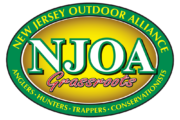Dear NJOA Supporters,
There is another bill (Resolution) being introduced in the NJ legislature in an to attempt to eliminate trapping. The bill is ACR-164/SCR124. So far there are only two sponsors, one in each house but we need to bring our concerns forward before this misguided bill gets wings. The bill seeks to overturn the decision by the Fish and Game Council that allows the use of enclosed foothold traps.
The assertion in the resolution that enclosed foothold traps violates the intent of the 1984 bill banning leghold traps completely ignores the voluminous record that the F&G Council used in making their determination. This issue was litigated in 2016 and the court clearly held that the F&G Council’s action was proper. The record of the safety and effectiveness of these traps is clear.
NJOA has already gone on record with the sponsors with clear explanations on why this bill is a bad idea. If you want to help you can contact Sen. Troy Singleton SENSINGLETON@NJLEG.ORG PH: (856) 234-2790 and Assemblyman Daniel Benson AsmBenson@njleg.org ph (609) 631-0198 and tell them you support the rights of New Jersey’s trappers.
Attached is an analysis done by Ed Markowski from 2016 that outlines the consequences of bad legislation like this.
RACCOONS, RABIES AND TRAPPING
First let’s lay out the facts. In 1984 the legislature passed a law making it illegal to possess steel jawed leg hold traps in New Jersey. The law took effect in 1985. When this law went into effect trappers were harvesting over 30,000 raccoons a year. With the banning of the leg hold trap that number dropped to less than 1,000 animals in 1985.
In 1985, New Jersey had yet to detect its first case of rabies in raccoons.
Between 1985 and 1989 rabies, carried on the back of an exploding raccoon population, had expanded to all 21 counties in New Jersey.
In 1989 the New Jersey Department of Health began keeping state wide statistics of rabies cases and the animal that exposed humans to the virus. Since 1989 through June of 2016 the Health Department has reported a total of 7,459 verified cases of terrestrial rabies in New Jersey. Of those 7,459 cases 5,413 or 73% were found to be in the raccoon population. According to the New Jersey Department of Health, Division of Epidemiology, “all areas of the State of New Jersey, including urban centers, have been affected by the raccoon rabies epizootic. Suburban areas in which raccoons, people and pets are in close proximity have had the largest number of cases. The rabies virus is now established in the raccoon population.” Currently only raccoons that have come in contact with humans or domestic animals are tested for the rabies virus.
In response to an expanding raccoon population and an increase in the reported number of rabies cases linked to raccoons the New Jersey Fish and Game Council approved the use of the encapsulated dog proof trap for the 2015/16 trapping season. This new trap was reviewed by the New Jersey Attorney General who found it to be a legal alternative to the steel jawed leg hold trap that was banned in 1984. Results from the first season’s use of the encapsulated dog proof trap indicates an increase in the raccoon harvest and not a single reported case of a non-target species being captured.
In response to a suit brought against the New Jersey Fish and Game Council, a three-judge panel of the Superior Court of New Jersey, Appellate Division, unanimously found that the encapsulated dog proof trap met the test of the 1984 law as an alternative to the steel jawed leg hold trap.
The use of these new trapping devices will provide for the effective control of a targeted wildlife population, raccoons, the reduction of exposure to the rabies virus to humans through the reduced incidence of contact with raccoons and the wise use of a renewable natural resource.
It’s time to make a choice, animal rights or the health and safety of the citizens of the state of New Jersey. Elmwood Park, New Jersey January 28,2016 Rabid Raccoon attacks and mauls a 6-year-old boy on his way to school. How would you feel if this was your child? Animal rights or public health and safety, managing wildlife with science or emotion, you make the choice.
Edward J Markowski
New Jersey Outdoor Alliance
New Jersey State Federation of Sportsmen’s Clubs
